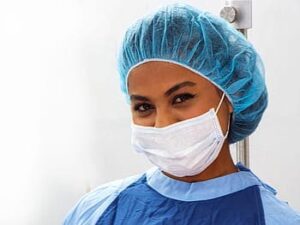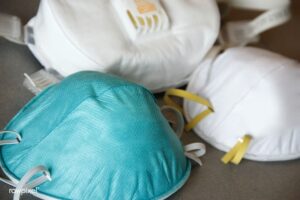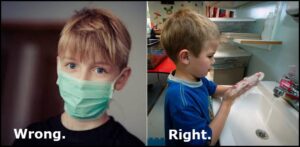When most people hear the word ‘biohazard’, they think of things like hospitals or other locales were bacteria, viruses, and other microorganisms may be present. But did you know that your house is full of them, too? As a company that specializes in biohazard cleanup, one thing we also offer is educational information such as this post, so that you can be informed and take precautions to protect yourself and hopefully not need our services.

Before we discuss what kinds of infectious organisms you might find in your own home, we should define the word ‘biohazard.’ Knowing what this means will help you understand what follows. From the Merriam-Webster dictionary, its most basic meaning is:
a biological agent or condition that is a hazard to humans or the environment
A biological agent is something that is (or was) alive. This is different from an inert substance that might be poisonous or dangerous. We think of biohazards mostly in terms of infections microorganisms like certain bacteria, fungi, and viruses. (Note that there are friendly fungi and bacteria as well.)
So, with that in mind, let’s take a look of what biohazards are commonly found in a home. Except for needles, these all originate in human and/or animal bodies.
Blood: It might surprise you just how common blood is in a home. Have a cold? You might get a bloody nose when you blow it. Bloody diarrhea might result from an intestinal illness. Someone working in kitchen preparing supper might nick themselves with a a knife or on the can opener, perhaps without even realizing it. That blood then might make its way into the food. Blood can carry all kinds of viruses and bacteria. Some of the most dangerous bloodborne pathogens are HIV as well as Hepatitis B and C. (These can all be fatal.)
Human and Animal Waste (Feces and Urine): Waste products from both humans and animals can carry all kinds of infectious or dangerous biohazards. Some may even be part of the dust that you commonly find in your home, because as feces particles dry, they crumble and if fine enough can be inhaled. Cleanup of animal or human waste should always be done with caution, as waste products can carry diseases. Fecal contamination of water and food is common; hence the frequent outbreaks of e coli and other ‘food poisoning’ organisms.
Pathological (Tissue) Waste: Though more commonly found in labs and hospitals, at times human or animal tissue may be found in a home. Here’s an example: Home births are becoming more common, and the placental tissue is considered a pathological waste product and needs to be disposed of properly. You may also have similar placental tissue if you have pets giving birth at home.
Sharps (Needles): Though technically not a biohazard themselves, we’ve included needles because both legal and illegal both drug use as well as insulin injection are common. Because of how they are used, needles automatically become contaminated with blood and may result in transmission of a biohazard (see ‘Blood’ above).
So how do you protect yourself and your family from these things? Knowing how to property clean, dispose, and disinfect is the answer. If you have any questions, we’re here to help. And if you have recently experienced a trauma in your home that has resulted in a large amount of biohazard material – especially blood – we offer safe, sanitary cleanup. We are a licensed biohazard cleaning and remediation company serving the Pacific Northwest, particularly in the Spokane and Seattle areas but other PNW communities as well.

 There are several types of face masks the general public is using, but in this particular article we’re going to cover the disposable ones most people are familiar with. These include surgical masks as well as the N95 masks worn both by health care professionals as well as other industries such as painters. The woman shown at right is wearing a surgical mask. The photo below shows an assortment of industrial N95 masks and respirators. (Please note: until very recently industrial grade N95 masks were not approved for health care workers; this restriction was lifted due to the short supply of medical-grade protective masks.)
There are several types of face masks the general public is using, but in this particular article we’re going to cover the disposable ones most people are familiar with. These include surgical masks as well as the N95 masks worn both by health care professionals as well as other industries such as painters. The woman shown at right is wearing a surgical mask. The photo below shows an assortment of industrial N95 masks and respirators. (Please note: until very recently industrial grade N95 masks were not approved for health care workers; this restriction was lifted due to the short supply of medical-grade protective masks.) The first thing you should be aware of is that the CDC DOES NOT recommend the public purchase and use the surgical grade masks or N95 masks (unless you have been directed otherwise by your health care professional) due to these masks being in limited supply and sorely needed by health care workers and first responders. Still, you may see individuals out in public with either of these types of masks.
The first thing you should be aware of is that the CDC DOES NOT recommend the public purchase and use the surgical grade masks or N95 masks (unless you have been directed otherwise by your health care professional) due to these masks being in limited supply and sorely needed by health care workers and first responders. Still, you may see individuals out in public with either of these types of masks.  Sure, it may have been annoying the way your mom made you wash your hands so much as you were growing up. Wash after going to the bathroom, wash your hands before you eat, wash your hands after playing outside. Wash, wash, wash. And water as hot as you could stand it and plenty of soap were required. With the recent outbreak of the COVID-19 coronavirus and near panic worldwide, the focus on how to protect against an infectious disease is at the top of the list for conversations on social media, news programs, and more.
Sure, it may have been annoying the way your mom made you wash your hands so much as you were growing up. Wash after going to the bathroom, wash your hands before you eat, wash your hands after playing outside. Wash, wash, wash. And water as hot as you could stand it and plenty of soap were required. With the recent outbreak of the COVID-19 coronavirus and near panic worldwide, the focus on how to protect against an infectious disease is at the top of the list for conversations on social media, news programs, and more.

